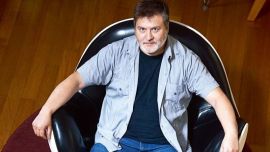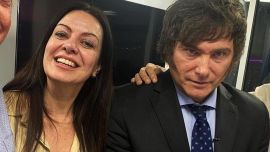For a sweeping description it seems best to quote my colleague Oscar Muiño (he wrote a good book about the life and times of the late Raúl Alfonsín), by way of opening explanation: “The majority of journalists – including friends of the government – took a step back from the core of the debate (of the pensions reform). The text is not just vulnerable, but was also disguised during the elections campaign. And it was passed without extended and deep discussion, as required by the subject, among the most important for the whole of society.”
Given that perversion is the rule of management in this country of mine, the government seemed to handle matters reasonably well, with a whole lot of shortcomings, of course. In the first place, President Mauricio Macri acted normal, in that he did not show all his cards during the campaign. But the nature of the campaign made it inevitable. Macri also hid the fact that the extent of financial disaster found when he took office was much worse than expected. The reason for playing down the figures was that revelation would have been like sabotaging his own first day: no way could he try to lure investors to Argentina with that kind of information in an inaugural speech.
There was a certain resemblance to the start of Raúl Alfonsín’s government in 1983. And Oscar Muiño’s book on Alfonsín comes in here again. International banks and agencies knew that Argentina was in default in 1983. But Alfonsín did not want to broadcast this to avoid frightening further what little investment Argentina had left and because resorting to foreign agencies was not Radical party policy. And he did not want the “assistance” offered by worldly banks and such like which would reveal that the lunatic fringe that took Argentina to war in the South Atlantic had done so after seven years of financial waste. The result in part, as most of the middle-aged around here remember, was hyper-inflation.
We should be able to assume therefore that there is something of Alfonsín in Macri, at least in terms of their failings. The other similarity is in the date and the riots. The government should have been better equipped, more aware that it would face the near certainty of riots and lootings at this time of year, given that such upheaval brought down the government of Fernando de la Rúa. Remember December 20-21, 2001?
Another feature of the week was the volume of baseless rumour regurgitated through the alternative channels available. One of these was an interesting combination, a coincidence perhaps, more than just rumour. That (personal) choice was an abundant report of an alleged meeting called by businessman and media operator Cristobal López, rallying friends and supporters to create an anti-Macri atmosphere. Two days later, the arrest of López was ordered by a judge investigating tax evasion on a grand scale. Any connection between the two incidents was rapidly denied.
Another open question, only partly answered in terms of annoyance and criticism, related to lower court judge Patricia López Vergara, who handles City administrative and tax matters. She ordered police detailed to guard the extended zone around Congress to do so without lethal weapons. The judge is already under public scrutiny because of her expensive tastes in dress and design, and she was very much portrayed as a kind of triumphant tart ruling over a small court. The police went out without guns and got a hammering: 88 injured by stone-throwers and beatings. The judge’s decision was seen as a prime example of stupidity, given that police are armed with heavy calibre hand-guns.
However, there is a question left to be answered. What if the boys and girls in uniform had been armed? Almost inevitably, albeit this is only a guess, there would have been members of the stone-throwing crowd who would have been shot and possibly killed. If that had happened, police would have had their casualties (probably not as many), they would have been vilified by the press, the public and by all political parties, the government would now be on the brink of a severe crisis and the Trot lot, the P.O. (Poder Obrero), would have a martyr to champion. No, it is not a crude joke; it is a fact with quotable precedents.
The biggest casualty will be the city authorities, who face a budget of 40 million pesos and more for repairs, mainly in the Two Congresses Square, which had “reopened” all spruced up just a few weeks back.
What still irks was President Macri’s repeated assurance that people want peace, that this is a peaceful country by nature. Oh, yeah? The people in the streets in La Plata, Córdoba, Rosario and other provincial centres, would not be in agreement. And neither would those whose working day was a shambles. These usually speak of solutions in terms of rapid execution.
************
The last few words in this column are for a friend. Last Tuesday my former colleague, Argentine- born Andrés Federman, died after a long, painful and uncomfortable ailment. We had been almost neighbours in North London,England, in the 1970s and we also worked together at times on two magazines in England.
He was an excellent source of information and his career ended as a press officer and public relations spokesman at the British Embassy in Buenos Aires. He was also an extremely competent analyst of daily news in Argentina and his country’s relations with other parts of the world. Often on the opposite side in many of our arguments, we were always able to end an exchange with a laugh. He retired some years ago and set up his own consultancy firm, but illness made work ever more difficult. Andrés Federman was a loyal and helpful friend, and he will be sorely missed by his colleagues, friends and family.
(*) Former editor of the Buenos Aires Herald (1994-2007)
























Comments